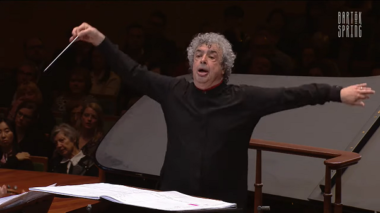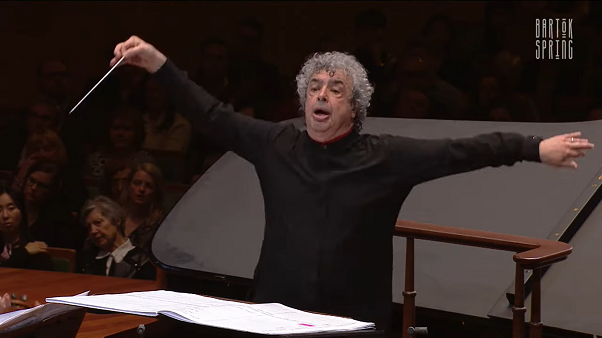 Hungary Bartók Spring International Arts Weeks 2023 festival [1]: Semyon Bychkov (conductor), Seong-Jin Cho (pianist), Czech Philharmonic. MŰPA, Budapest, 31.3.2023. (AK)
Hungary Bartók Spring International Arts Weeks 2023 festival [1]: Semyon Bychkov (conductor), Seong-Jin Cho (pianist), Czech Philharmonic. MŰPA, Budapest, 31.3.2023. (AK)

Bartók – The Miraculous Mandarin, Op.19 (orchestral version)
Thierry Escaich – Symphonic Etudes for piano and orchestra
Stravinsky – Petrushka, 1947 revised version
The recent Bartók Spring festival in Budapest, subtitled as International Arts Week, did indeed open (31st March) as well as closed (16th April) with notable international orchestras from outside Hungary.
The opening concert was a dignified, high quality as well as exciting concert, delivered by the Czech Philharmonic under the direction of their music director Semyon Bychkov.
Bychkov’s evident mastery of complicated scores and large orchestral forces made their taxing programme sound exciting as well as wholly satisfying without any hints of the inherent musical and technical difficulties.
The pairing of ballet scores by Bartók and Stravinsky are wholly justified in all dimensions. Composed only eight years apart – Petrushka premiered in 1911, Bartók completed the Mandarin in 1919 – both compositions are scored for large forces (although Petrushka’s 1947 revised version is slightly slimmed down), with Bartók adding even an organ to the regular orchestral instruments which in both scores also include piano, celeste and harp.
Arguably, the characters of Petrushka and the Mandarin have much in common: both are outsiders whose love is rejected but ultimately both triumph in unexpected conclusion.
Bartók and Stravinsky had an uneven appreciation of each other. Bartók not only respected Stravinsky but often singled him out as a genius whose compositions are unique, often drawing from folk music. Stravinsky was less kind about Bartók; he could not understand Bartók’s life-long commitment to folk music. Furthermore, Stravinsky denied any folk music influence on his own compositions, yet some of his music – especially his ballet music – clearly show some Russian elements. The fourth part of Petrushka, Shrove-Tide Fair, is jubilant with what I have known over the decades as a Russian folk song.

Bychkov embarked on the Bartók score with utmost excitement, thus anticipating the concluding chase. Between the opening and masterly conclusion, he elicited warm singing from the orchestra with his expressive hand movements.
Petrushka received similar dedication from Bychkov, who encouraged – rather than dictated – beautiful solo contributions from clarinet, flute, trumpet and bassoon. Music consists of song and dance as, indeed, it did in Bychkov’s performance. They presented the slightly slimmed down 1947 revised version, although I counted two harps on the stage, not one.
Between Bartók and Stravinsky, we heard the second ever performance – and Hungarian premiere – of Thierry Escaich’s Symphonic Etudes that is a concerto for piano and orchestra. Commissioned by Semyon Bychkov and the Czech Philharmonic, the piece received its world premiere a fortnight earlier (16th March) in Prague, with South Korean Seong-Jin Cho as the piano soloist.
Still a young man, Seong-Jin Cho seems to have a large following, deservedly so. He tackled the four-movement composition with effortless technique, managing to create singing melodic lines and dynamic contrasts which in lesser hands might have been absent. Conductor Bychkov was rock solid and again fully committed to the score, providing the best conditions for what on first hearing felt like a very interesting piece. The programme notes indicated baroque influence – the fourth movement is titled as Toccata – but my ears heard Bartók and Stravinsky … and, of course, Escaich. A French composer and organist, a professor of composition in Paris, Escaich fitted perfectly between Bartók and Stravinsky. As for the audience, I almost forgot that I was in Hungary: I have never seen so many Korean people in one gathering. I doubt if there are so many in Budapest, they are likely to have come from Vienna and further afield.
The Czech Philharmonic truly distinguished themselves at this concert. Not surprisingly, as they have a distinguished past as well as present. In 1896, their first concert was conducted by Dvořák. It was this orchestra which premiered Mahler’s Seventh Symphony, conducted by Mahler, in 1908. Later their chief conductor was Václav Talich.
Semyon Bychkov has been leading the orchestra for the past five years. On the death of previous music director Jiří Bělohlávek, representatives of the orchestra asked Bychkov – with whom they have been working from time to time since 2013 – to be their music director and mentor. One hundred percent of the orchestra voted for Bychkov – a rare achievement – who accepted the invitation and went on to forge an even stronger bond with the orchestra. For now, the maestro’s contract with the orchestra has been extended to 2028 … rightly so.
Agnes Kory
